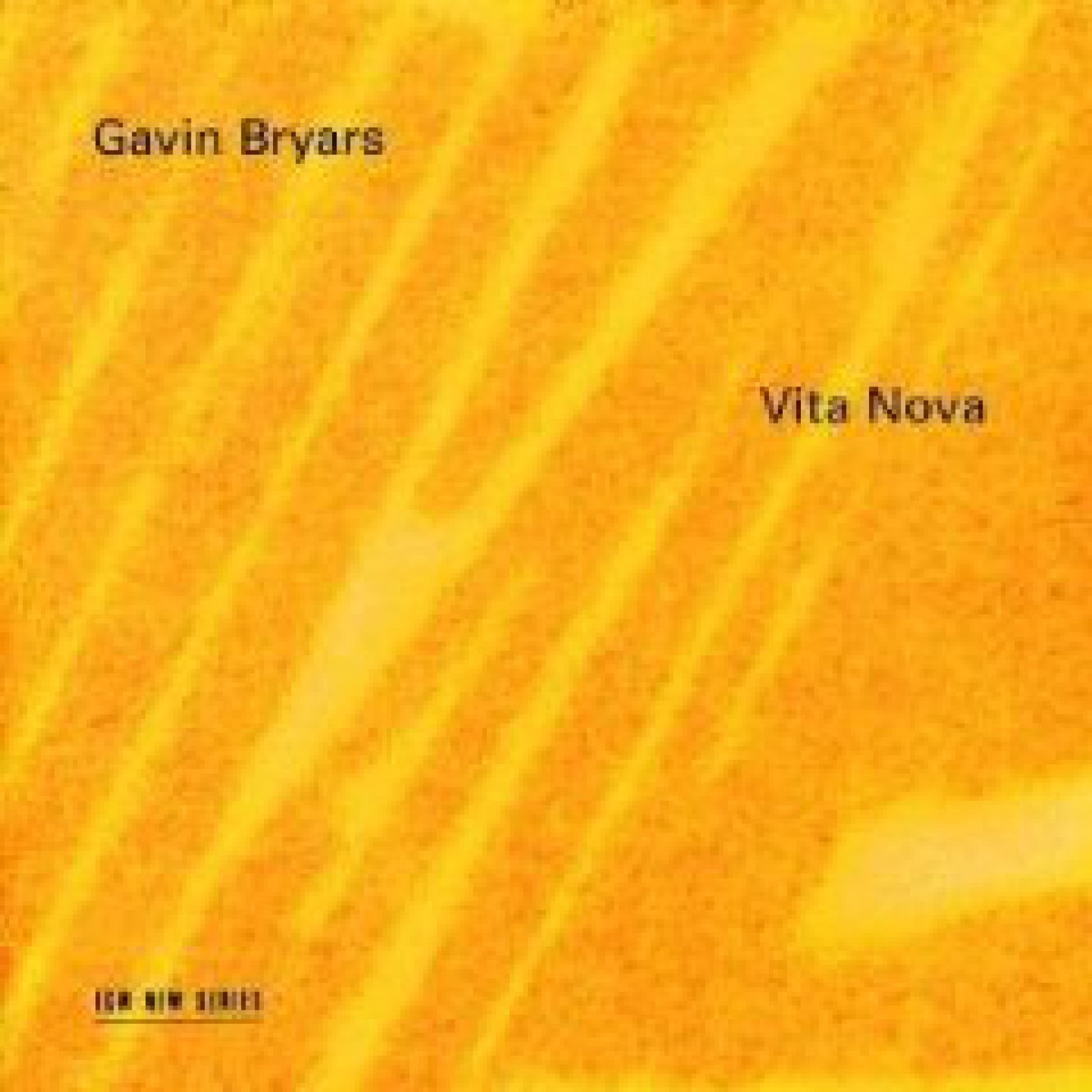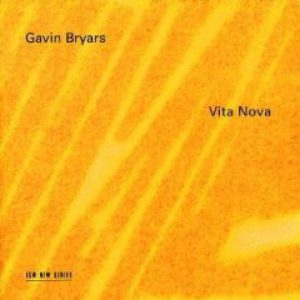ECM New Series 1533 445 351-2
Gavin’s Notes:
Incipit Vita Nova (1989)
Incipit Vita Nova is for male alto and string trio and sets those short phrases that appear in Latin rather than Italian in Dante’s La Vita Nuova. It was written in February 1989 to celebrate the birth of Vita, the first child of my friends Erica and Robert Hewison.
I wrote the piece at the same time as I was writing Cadman Requiem and, like that piece, it represents a personal response to a life. Both were written for members of the Hilliard Ensemble with whom I had developed a close working relationship.
Although I had decided to write the piece long before the birth I did not start the piece until after the baby was born, waiting until I knew whether the baby was a boy or a girl, and wanting to know the baby’s name – Vita.
I originally looked for all uses of the word “Vita” (life) among Pico della Mirandola’s Conclusiones (I had set Pico for Glorious Hill, my earlier piece for the Hilliard) and eventually added one of these sentences (“Omnis vita est immortalis”) as the penultimate line of the text while working on La Vita Nuova (“The New Life”) as the main source.
The first performance was given by David James at St. Mary de Castro Church, Leicester, on April 1st 1989, and shortly afterwards along with the first performances of Cadman Requiem in Lyon and Marseilles.
The piece is dedicated to Vita, Erica and Robert Hewison.
Gavin Bryars.
Text:
|
Incipit Vita Nova Ecce deus fortior me qui veniens dominabitur mihi. Apparuit iam beatitudo vestra Vide cor tuum Tempus est ut praetermictantur simulacra nostra.. Nomina sunt consequentia rerum Hosanna in excelcis. Bella mihi, video, bella parantur. (vita) qui est per omnia secula benedicta, benedicta. Omnis vita est immortalis. Nomina sunt consequentia rerum |
A new life is beginning Behold a God more powerful than I who comes to rule over me Your source of joy has now appeared Behold your heart It is time for false images to be put aside Names are the consequences of things Hosanna in the highest Things beautiful to me, I see beautiful things are being prepared. (a life) which is for all times blessed, blessed. All life is immortal. Names are the consequences of things. |
Glorious Hill (1988)
Glorious Hill was commissioned by The Hilliard Ensemble and first performed by them at its summer Festival of Voices in Lewes, Sussex, in August 1988. It was the first piece I wrote for the ensemble and I focused on the singers’ unique ability to move with ease from early music to tonal music of the present day. There were techniques which I asked for which I hardly needed to notate – the staggered breathing of the two tenors to supply a continuous unbroken held note for example – and the piece moves between passages for solo voices and sections of highly chromatic homophony, almost as if the music were switching between the 12th century of Perotin and the 16th century of Gesualdo. Each of the four voices is given its own solo passage – sometimes accompanied, sometimes quietly supported by the other voices. The title, Glorious Hill comes from the name of the small-town Mississippi setting of Tennessee Williams’ Summer and Smoke. I wrote the music for the 1987 production of this play at the Leicester Haymarket Theatre, the first time I had written any incidental music for the stage. Williams makes very specific demands in terms of music and there is one particularly powerful scene, the penultimate one, throughout which music and atmospheric sound effects are continuous. The principle character Alma argues passionately about the vital importance of human choice with the man to whom she has, too late, admitted her love. I watched this section every night throughout the 4 week run of the play watching the different ways in which the actress, Frances Barber, played the scene. There is a powerful emotional and philosophical connection between the imagery of this scene and a passage from the Renaissance philosopher Pico della Mirandola’s Oration on the Dignity of Man which forms the text of Glorious Hill. This passage has been described as one of the few passages in Renaissance philosophy to treat human freedom in a modern way. The text, which is sung in Latin, is addressed by God to Adam before the fall from grace. Gavin Bryars.
Four Elements (1990)
Four Elements was commissioned by Rambert Dance Company for the ballet by Lucinda Childs in 1990. I got to know Lucinda’s work through the director Robert Wilson at the time I was working on his The CIVIL WarS. from 1981 to 1984. I had let Lucinda have some tapes and she made a solo dance, Outline, to one of these pieces (Out of Zaleski’s Gazebo). The commission from Rambert provided the opportunity, finally, for us to meet. The initial idea for the dance was hers and we discussed many times throughout that year the nature of the piece, its structure and relative pace. The music falls into in 4 sections: ‘Water’, ‘Earth’, ‘Air’ and ‘Fire’, each one being given a different musical character in terms of tempo, instrumental emphasis and colour; and theatrical character through different permutations of the 8 dancers (‘Earth’, for example uses only the 4 females, while ‘Air’ uses the 4 male dancers), the relative complexity of repetitive movement and the use of space. Part 1 – ‘Water’ – is slow and features the bass clarinet and colouristic percussion (including the water gong). Part 2 – ‘Earth’ – is at a medium tempo with a slow melodic line for tuned percussion and a mirrored line for wind instruments. Part 3 – ‘Air’ – is fast with an accompaniment by keyboards supporting high solo parts for (in sequence) alto saxophone, flugelhorn, and sax with French horn. Part 4 – ‘Fire’ – is slow with overlapping lines for unison brass (trombone, horn, flugelhorn) and amplified double bass, using effects pedals, with bass clarinet, over slow keyboard arpeggios and ends with a Coda in which David James’ alto voice sings a short vocalise over low drones from the ensemble…. As well as working closely with Lucinda I also had a fruitful collaboration with Roger Heaton, then music director of Rambert who is also clarinettist in my own ensemble. I deliberately chose to use a range of instruments that I had not used before – especially the combination of instruments in the wind section (alto saxophone, bass clarinet, flugelhorn, French horn and tenor trombone). The piece was first performed at the Apollo Theatre Oxford in November 1990 and subsequently filmed for BBC Television’s Dancemakers series. Gavin Bryars.
Sub Rosa (1986)
I wrote Sub Rosa for a concert in the Flanders Festival in Belgium in the autumn of 1986. Shortly before that time I had made my first recording with ECM (Three Viennese Dancers) and had been given a number of recordings that ECM had made over the years. Among these was a solo album by Bill Frisell called In Line, which I liked very much. I was particularly fond of the second track, Throughout, which I used to play on headphones during take-off on plane journeys to overcome my fear of flying. Sub Rosa is an extended paraphrase of and comment on this piece. I made a transcription of Bill’s solo and combined phrases in new ways, added others, altered the harmonic rhythm, and changed the instrumentation to fit that of my ensemble at the time. The room in the art gallery where we played was adjacent to a large circular room which had an astonishingly long reverberation time, and I placed the descant recorder in that off-stage space. Just as the distant recorder (a part now taken by the electric guitar) is generally paired with the clarinet, so the solo violin is initially mixed with the bowed vibraphone giving an equivalent sense of distance. When Bill Frisell and I met for the first time in Leicester during his British tour we had a meal together at the Curry Fever Restaurant and he listened to the Belgian recording on headphones between courses. “It was,” he said, “like some crazy dream”. Later Bill and I collaborated on a subsequent recording project for ECM (After the Requiem). Sub Rosa is the music for the extraordinary final part of William Forsythe’s Slingerland for the Frankfurt Ballet where he takes the music into a further dreamlike state by having all the dancers move slowly through space supported by fly wires. The piece is dedicated to Bill Frisell. Gavin Bryars.
Performers:
Tracks:
2. Glorious Hill (The Hilliard Ensemble)
3. Four Elements (Large Chamber Ensemble)
4. Sub Rosa (Gavin Bryars Ensemble)

